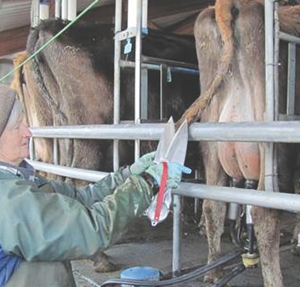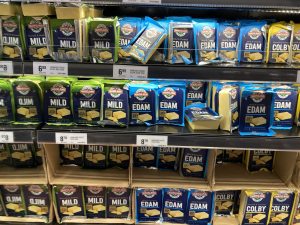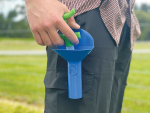His Watson Multi Shears livestock trimming shears are capable of blade changes.
Watson first got the idea for his shears when thinking of ways to fit a tool-grade steel blade onto hand shears.
He says the design of the traditional hand shears used in the dairy shed has changed little since they were first made 300 years ago. The use of high-carbon steel means blades can’t be changed, and they blunt and can bend if dropped frequently.
His idea was to take advantage of modern high quality composite tool steels. “Newer, better steels are available and my idea was to take advantage of that.”
The problem is that tool steels can’t be made into spring steel and external blades couldn’t be added to spring steel due to the constant pressure they would be under.
So Watson experimented with a spring operated bearing system. He and a Rolleston engineer developed a wooden concept model which led to the formation of the business and helped conceptualise the first working prototypes.
Wool Board funding enabled Watson to retain Christchurch design company Ross Taylor Industrial Design to develop concepts.
He then spent 20 years testing and improving the shears in his day-to-day work and has now shorn at least 8000 sheep using various prototypes.
He says the secret to the longevity is a self-lubricating plastic bearing system. “The prototype that has done most of the work has shorn 5000 sheep with no signs of wear. For the casual user these shears are designed to last 20 years.”
What sets the shears apart from traditional shears is their capability for blade changes Watson says. “Cold work tool steel is vastly superior to high carbon when it comes to shearing.”
This gives a longer life in dairy sheds. “The superior tool-steel blades are better able to withstand removal of dags around cows’ tails because of having better edge retention than the old style clippers.”
Farmers will be able to use the spring-bearing shears off-the-shelf – not possible with traditional shears. “You’ve either got to get new shears then work on them until they are ready to use, or buy them secondhand.”
Originally developed for high country sheep shearers, the new shears have much wider application, Watson says. “We’re looking at lifestyle farmers and dairy farmers.”
Watson Multi Shears plans to offer a workshop grinding and sharpening service, and do other maintenance.
Tel. 03 314 4419
www.watsonmultishears.co.nz
















